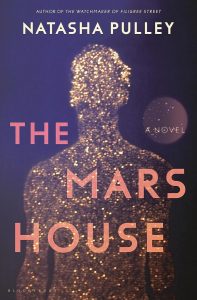Niall Harrison Reviews The Mars House by Natasha Pulley
 The Mars House, Natasha Pulley (Bloomsbury US 978-1639732333, 480pp, $29.99, hc). March 2024.
The Mars House, Natasha Pulley (Bloomsbury US 978-1639732333, 480pp, $29.99, hc). March 2024.
If, a century from now, there are enough readers and enough academic presses to warrant reprinting early 21st-century Anglophone science fiction, editors in search of candidates might do worse than considering Natasha Pulley’s The Mars House for their list. In its style, its intellectual interests, and the strengths and weaknesses of its execution, Pulley’s sixth novel is nothing if not representative.
So: The novel opens in a medium-distance future London, which is now a drowned city (check) and a geopolitical backwater (check); economic and cultural power have moved to countries such as Saudi Arabia and Nigeria. After a particularly bad flood, and with no good options on Earth, straightforward honourable working-class ballet dancer January Stirling is encouraged to seek asylum in the city-state of Tharsis, a Chinese (check) colony on Mars. On arrival, he finds a world that has been partially terraformed by the first settlers, who have adapted themselves both physiologically and politically to their new planet; but Tharsis is a segregated society (check) heading for a tense election, with the genderless (check) and vaguely elven ‘‘Naturals’’ increasingly wary of ‘‘Earthstrong’’ immigrants. January, inevitably, finds himself at the centre of events, via a romance trope (check), namely a marriage of necessity to Aubrey Gale, a beautiful and sophisticated nationalist who states that – owing to the physical threat they pose to the less physically robust Naturals – all Earthstrongers should be required to ‘‘naturalise,’’ undergoing painful and debilitating medical procedures to reduce the physical threat they pose to Naturals. When a dust storm leads to a lockdown (check) and threatens to shut off the solar fields, owned by Gale, that provide Tharsis with power, a tense situation becomes a full-blown political crisis (check).
It’s a mix that brings to mind not just the work of authors such as Becky Chambers, Aliette de Bodard, and Mary Robinette Kowal, but, occasionally, such further-flung reference points as David Mitchell (via a metatextual reference that ties this novel to the timeline of Pulley’s earlier steampunk series) and Andy Weir (the solar crisis is fixed via some thoroughly argued engineering; I did not check the math). Which is to say that The Mars House is narratively compelling, emotionally transparent, ethically reassuring, scientifically convenient (math notwithstanding, Pulley’s Mars overall does not feel particularly realist), and stylistically welcoming, with a wit that tends towards whimsy. The latter is most prominent in the occasional footnotes, which include such digressive observations as the fact that ‘‘Rugby is traditionally used as a way for small countries to remind everyone else why they would regret it if they invaded,’’ and that the Communist Party manifesto is ‘‘An inoffensive document in which a tired German sets out his grand dream of an affordable nationalised rail service.’’
A light touch with political commentary, however, does not always mean a sure touch. As if you couldn’t guess from the setup, Gale is a better person than they initially appear to be, but the central political conflict – Tharsis Naturals vs Earthstrong immigrants – is somewhat harder to process. Early on, it seems very clear that January’s situation is intended to parallel the UK’s current immigration debate and, in particular, how to manage asylum-seekers crossing the channel in ‘‘small boats’’; in this reading Tharsis is the UK, and Gale’s rhetoric echoes that of right-wing politicians. January is hyperaware of how Natural citizens view him and other Earthstrongers, and when legislation is proposed that would lead to compulsory naturalisation, a ‘‘slow, cold feeling’’ lingers with him that is surely meant to evoke the experience of those who were allowed into the UK, only to be faced with a ‘‘hostile environment’’ policy. The rather substantial problem with this reading, however, is that Earthstrongers literally do pose a physical threat to Naturals just by existing in the same space as them, in a way that is not true of immigrants on Earth, and so part-way through the novel the metaphor is switched: Earthstrongers are like men and Naturals are like women, and the naturalisation process – which, it is claimed, is a big reason why gender-based violence is almost unheard of on Tharsis, and has a near-100% conviction rate when it does occur – is an appropriate response to physiological dimorphism. Except this doesn’t hold water either, since it entirely denies the ability of the more powerful group to regulate their behaviour, and so we move on to a third metaphor, in which Tharsis is more like Hong Kong than the UK, and the problem with Earthstrongers is not their individual strength per se, but the fact that Earth vastly outnumbers Tharsis, and that if mass asylum is granted, Tharsis will become an extension of an Earth state (specifically China), and its cultural distinctiveness will be lost.
Done right, invoking multiple metaphors and holding them in superposition can reinforce the specific reality of an imagined setting; but done wrong, which can happen when they are deployed sequentially, the metaphors have a tendency to go rogue, and wreak interpretative havoc throughout a text. To put it mildly, if the text allows an equivalence between Hong Kong’s relationship to China and the UK’s relationship to asylum seekers, something has definitely gone awry. And all of this is superstructure built on an already shaky foundation: January, although a member of the oppressed in this imagined setting, is demographically reasonably privileged in our present, and whether this sort of flip expands empathy or truncates it is very much an area where opinions differ. None of which is to say I didn’t enjoy actually reading The Mars House. When I wasn’t being distracted by untoward implications, the pages zipped by. But I enjoyed it most when imagining myself as that future editor, delighted to have found a type specimen that so clearly reveals the preoccupations of its contemporaneous world.
In Niall Harrison‘s spare time, he writes reviews and essays about sf. He is a former editor of Vector (2006-2010) and Strange Horizons (2010-2017), as well as a former Arthur C. Clarke Award judge and various other things.
This review and more like it in the March 2024 issue of Locus.
 While you are here, please take a moment to support Locus with a one-time or recurring donation. We rely on reader donations to keep the magazine and site going, and would like to keep the site paywall free, but WE NEED YOUR FINANCIAL SUPPORT to continue quality coverage of the science fiction and fantasy field.
While you are here, please take a moment to support Locus with a one-time or recurring donation. We rely on reader donations to keep the magazine and site going, and would like to keep the site paywall free, but WE NEED YOUR FINANCIAL SUPPORT to continue quality coverage of the science fiction and fantasy field.
©Locus Magazine. Copyrighted material may not be republished without permission of LSFF.








